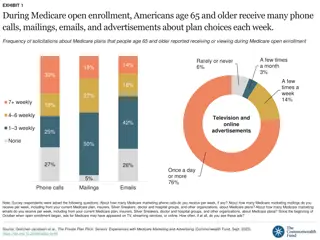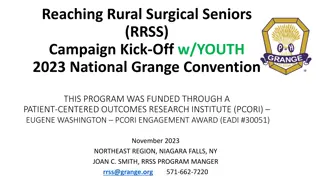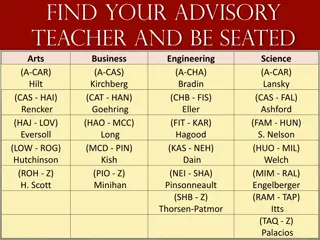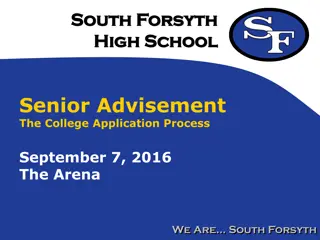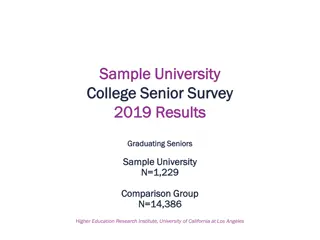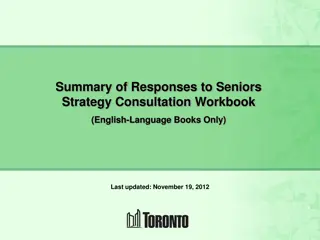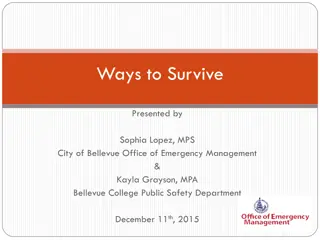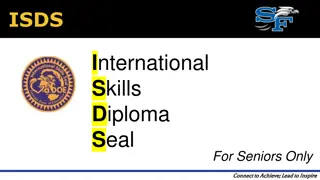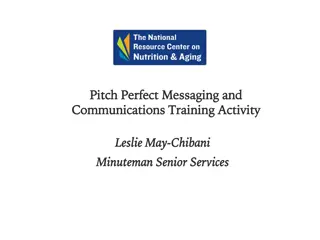Senior Plan: Essential Steps for High School Seniors
In this guide for high school seniors, discover key steps to succeed in the senior year and beyond. From preparing for aptitude tests like the ACT to navigating the college search process, FAFSA applications, and college admissions, this comprehensive resource provides valuable information and tips to help seniors transition smoothly into higher education. Learn about important deadlines, financial aid opportunities, and application procedures to make informed decisions for your academic future.
Download Presentation

Please find below an Image/Link to download the presentation.
The content on the website is provided AS IS for your information and personal use only. It may not be sold, licensed, or shared on other websites without obtaining consent from the author.If you encounter any issues during the download, it is possible that the publisher has removed the file from their server.
You are allowed to download the files provided on this website for personal or commercial use, subject to the condition that they are used lawfully. All files are the property of their respective owners.
The content on the website is provided AS IS for your information and personal use only. It may not be sold, licensed, or shared on other websites without obtaining consent from the author.
E N D
Presentation Transcript
Senior Plan A guide for High School Seniors
Aptitude Tests ACT/SAT/ASVAB Most of you will need to take the ACT. Your ACT score will help with college admission. The higher the ACT score, the easier it is to get into most colleges. With this in mind, your ACT score is not the ONLY determining factor so do the best you can, but don t worry excessively. 2020 Dates at Appleton City are October 10th, 24th; December 4th; February 6th; April 17th. Try to be finished with testing by December, and only use the February and April dates as backups. The ACT typically costs between 50 and 70 dollars. If you cannot afford to pay the fees, please speak to your school counselor.
The College Process College Search FAFSA Applications Acceptance/ Financial Aid Commitment
College Search One of the best resources for you is through Missouri Connections. Here are the easiest steps: Login as a Guest; Select your city and type in your zip code. Select the Education Tab. Select Which Schools Match My Preferences? then select School Sort . Select Undergraduate and then follow the instructions. Once you have come up with a list of colleges that line up with your major, you should write down: At least one Safety School At least one Match School At least one Reach School
FAFSA FAFSA stands for the Free Application for Federal Student Aid. This is the form that you fill out each year in order to get money to pay for college. So it s important. The FAFSA opens October 1st, and closes in June. you should fill it out as soon as possible in order to streamline your college application process. You will need to have an FSA ID in order to fill this out. This is a simple process that can be done by clicking HERE. It is highly suggested that you fill out the FAFSA with your parents or guardians, mainly because you will need the following: Financial Documents (Tax information) Dependency Status Schools you would like to send your FAFSA to (what you completed on the last slide). We will have another presentation on this soon. Here are some resources.
Applications In order for colleges to know you are interested, you need to fill out an application for that college. Each college has its own application deadline, so make sure to take note! Some colleges got together and decided to make the process a bit easier by creating the Common App an Application that will work for hundreds of different colleges, that only makes you fill out ONE application. This is a great time-saver, so CLICK HERE and fill it out. If your college doesn t use the Common App, just navigate to their website using the keyword Admissions . So for example, if you are trying to apply for Mizzou, you would Google Mizzou Admissions . Fill out a Freshman Application. IMPORTANT: Applications take time. Some require letters of reference, which you need to request from teachers with at least 2 weeks notice. Apply early so you don t have to worry about it later. You should apply to no more than 10 colleges. The process is long, and there are often application fees. If you cannot pay the application fees, please contact your counselor.
Acceptance/ Financial Aid Generally speaking, you should try to have your applications in to colleges before Winter Break. Many colleges application deadlines fall around December or January. However, due to competitive scholarships the sooner, the better! Once you have submitted your applications the wait time for letters of acceptance can vary. Some can take hours, some can take weeks, some can take over a month. When you are accepted to a college, they will often send a Financial Aid Award Letter with the acceptance. This will give you an idea of tuition costs, as well as offsets due to scholarships. This is NOT your final cost you can lower this amount even more with scholarships. The letter of acceptance will give you further instructions on next steps for your particular college.
Commitment Once you have received your acceptance letters and taken financial aid into consideration, you will often need to let colleges know if you are accepting or rejecting their offer of admission. This is an important step, as it often frees up scholarships for other students, and also allows other students to be accepted to that institution who were on the fence . Each school has a slightly different commitment process, but all of the steps lead toward the same end: Class Enrollment, Registration, Room and Board decisions, and some form of deposit. If you have any questions about a specific school (even before you apply), you should reach out to a College Admissions Representative at that school. It is their job to answer any questions that you have so ask away!
Scholarships Scholarships are a GREAT way to pay for college. So let s figure out the process. First, you need to be aware of scholarships awarded through your college. As soon as you submit an application, you should send an e-mail to your admissions rep simply saying, Hello. I just submitted my application. Where should I look for scholarships offered through (institution name here)? Follow their instructions. Second, you should check out local scholarships. These will be located in the counselor s office or on the school counseling website. Third, you should check out websites like FastWeb.com and Scholarships.com. They will have you fill out a questionnaire that funnels down the scholarships that are applicable to you. The trick is to apply for scholarships with the smallest pool of applicants this increases your likelihood of receiving the scholarship.
Bits and Bobs A+ -- Are you eligible for A+? Do you have all of your hours? Did you maintain 95% attendance? How s your GPA looking? Is your EOC Math score proficient or above? These are all questions you should ask your counselor if you are wanting to use A+ money at your institution of choice. Military Interested in the Military? Likely, they are also interested in you. The process usually involves meeting with a recruiter, doing some paperwork, and setting up dates for boot camp, training, etc. Talk to your counselor. Workforce Not everyone goes to college. Obviously. If you are in this boat, meet with your counselor so that they can hook you up with some resources (as you will likely be adulting much sooner than your friends. There s LOTS to know, and the information is much easier to find out now.



